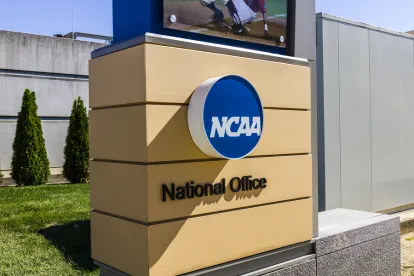Governor Gavin Newsom and the California legislature shook up the collegiate sports landscape with the introduction and passing of legislation allowing college athletes to benefit from their name, image, and likeness (NIL) in 2019. Several states have followed California’s legislative lead and proposed similar legislation—with some duplicating the exact terms of the California law, up to and including the delayed effective date of the proposed legislation until July 1, 2023. While others, like New York, have added specific costs for colleges and universities to the cost neutral California law in their proposed legislation. In addition, a number of other states, including Florida, Pennsylvania, and Michigan, have proposed NIL legislation that would go into effect as early as summer 2020.
NCAA President Mark Emmert, Big-12 Conference Commissioner Bob Bowlsby, University of Kansas Chancellor Douglas Girod, and NCAA Student-Athlete Advisory Committee Chair Kendall Spencer have testified before a Senate subcommittee regarding NIL athlete compensation. During the hearing,
Emmert acknowledged athletes should be able to benefit financially from their NIL but raised concerns about new aggressive state legislation that does not allow the NCAA the time it needs to enact changes and also preserve the “collegiate model.”
Emmert and Girod also voiced concerns during their testimony over patchwork state legislation across the country that will lead to an unlevel playing field among the NCAA’s member institutions. Bowlsby expanded on these concerns and
cautioned against an “open market of recruitment” that would put smaller and rural institutions at risk to constant poaching of their athletes by institutions with more resources and larger markets.
Ramogi Huma, Executive Director of the National College Players Association – a nonprofit advocacy group for college athletes which claims to have over 20,000 members from Division I campuses, offered an alternative perspective at the same hearing. Huma acknowledged that federal legislation could be helpful in establishing “guardrails” for the changing athlete compensation landscape. However, referring to the O’Bannon litigation in the Ninth Circuit, Huma argued that the NCAA should not be granted an anti-trust exemption which will continue to artificially cap athlete compensation to advance of the illusion of “competitive equity.” Huma asked that any congressional action support rather than hinder the legislation pending in the states which will open up marketplaces for athletes.
Montana Senator Jon Tester noted that the current system is broken and the concept of having fifty different states enacting fifty different rules will pose a problem. However, Tester cautioned against Congress making a solution. Rather, Tester urged the NCAA to advance its timeline and share the proposals it will consider this April with the subcommittee to allow Congress to help the NCAA solve the athlete compensation problem.





 />i
/>i

